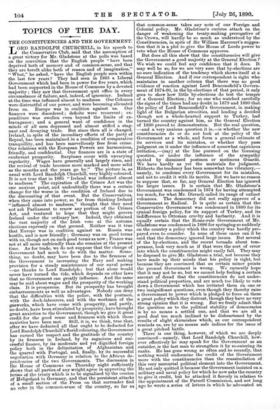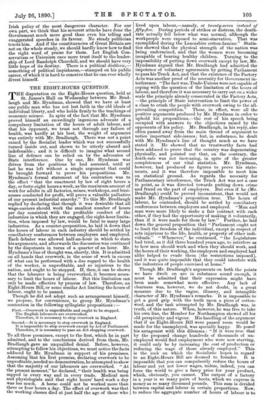TOPICS OF THE DAY.
THE CONSTITUENCIES AND THE GOVERNMENT. LORD RANDOLPH CHURCHILL, in his speech to the Conservative Club, said that the assumption of a great victory for Mr. Gladstone at the polls was based on the conviction that the English people " have been deprived both of memory and of common-sense, and that they are bereft alike both of reason and of imagination." " What," he asked, " have the English people seen within the last few years ? They had seen in 1885 a Liberal Government which had been in power for five years, which had been supported in the House of Commons by a devoted majority ; they saw that Government quit office in every circumstance of failure, and, indeed, of ignominy. Ireland at the time was inflamed almost to madness. Our Colonies were distrustful of our power, and were becoming alienated from us. Europe was in coalition against us. Our finances were disordered ; deficits were recurrent ; ex- penditure was swollen even beyond the limits of ex- travagance ; and a general want of confidence in the minds of all men depressed and almost stifled a stag- nant and decaying trade. But since then all is changed. Ireland, in spite of the incendiary efforts of the party of Repeal, has been maintained in a condition of comparative tranquillity, and has been marvellously free from crime. Our relations with the European Powers are harmonious, friendly, and confidential. Our finances are in a state of exuberant prosperity. Surpluses occur with unvarying regularity. Wages have generally and largely risen, and the revival of trade becomes more marked and more solid as the months and the years go by." The picture is, as usual with Lord Randolph Churchill, very highly coloured. It is not true that in 1885 " Ireland was inflamed almost to madness." The expiration of the Crimes Act was the one anxious point, and undoubtedly there was a certain change for the worse in the condition of Ireland due to the discounting of that event. But the Conservatives, when they came into power, so far from thinking Ireland "inflamed almost to madness," thought that they need not ask Parliament to renew any portion of the Crimes Act, and ventured to hope that they might govern Ireland under the ordinary law. Indeed, they obtained the vast majority of the Irish vote at the autumn elections expressly on that ground. Neither was it true that Europe was in coalition against us. Russia was hostile, and is now friendly ; Germany was on good terms with us, though not on such good terms as now ; France was not at all more unfriendly than she remains at the present time. As for trade, we do not suppose that the change of Government had much to do with the matter. Some- thing, no doubt, may have been due to the firmness of the Government in increasing the Navy and making provision for a steady maintenance of our naval power —no thanks to Lord Randolph ; but that alone would never have turned the tide, which depends on other laws that no Government can greatly influence. And the same may be said about wages and the prosperity of the working class. It is prosperous. But its prosperity has brought embarrassments as well as advantages. Nobody can deny that the difficulties with the police, with the postmen, with the dock-labourers, and with the workmen of the gasworks, which have come with prosperity, and partly, no doubt, have been stimulated by prosperity, have brought great anxieties to the Government, though we give it great credit for the good sense and firmness with which those anxieties have been met. Still, it is, we think, true that, after we have deducted all that ought to be deducted for Lord Randolph Churchill's florid colouring, the Government has earned the respect and the gratitude of the country by its firmness in Ireland, by its sagacious and suc- cessful finance, by its moderate and yet dignified foreign policy both in the delimitation of Afghanistan and the quarrel with Portugal, and, finally, by its successful negotiation with Germany in relation to the African de- pendencies of the two Governments. The discussion in the House of Commons on Thursday night sufficiently ohm that all parties of any weight agree in approving the terms of the treaty which is to be signalised by the cession HeligolsAll to Germany, and that the persistent attacks of a small section of the Press on that surrender find no echo iq the eoinnlon-Sense cf the cowitry, so far as that common-sense takes any note of our Foreign and Colonial policy. Mr. Gladstone's curious attack on the danger of weakening the treaty-making prerogative of the Crown, will hardly be so much as understood by the Constituencies, in spite of Sir William Harcourt's sugges- tion that it is a plot to give the House of Lords power to veto what the House of Commons approves. But does all this show that the constituencies will give the Government a good majority at the General Election ? We wish we could feel any confidence that it does. It may well be so, for we are very sure that by-elections are no sure indication of the tendency, which shows itself at a General Election. And if our correspondent is right who. maintains in another column that there was no good evidence of reaction against Lord Beaconsfield's Govern-. ment of 1874-80, in the by-elections of that period, it only goes to show how little by-elections do test the temper- of a General Election; for no one who watched carefully the signs of the times had any doubt in 1879 and 1880 that the policy of Lord Beaconsfield's Government, in making light of the Bulgarian atrocities, and lending a decided though not a whole-hearted support to Turkey, had turned the country against him, as the General Election of 1880 proved to demonstration. But the real question, —and a very anxious question it is,—is whether the new constituencies do or do not look at the policy of the Government as a whole, and form a general estimate of its services and its mistakes, or whether they pass' judgment on it under the influence of somewhat capricious irritation,—(say) at the line pursued on the licensing- question, or under the influence of the sympathy excited by dismissed postmen or mutinous Guards. We have hardly as yet the materials for judgment.. Hitherto the tendency has been somewhat too vibratory,— namely, to condemn every Government for its mistakes, and not to credit it with its merits. But we have no reason to suppose that, so far, any General Election has ignored the larger issues. It is certain that Mr. Gladstone's Government was condemned in 1874 for having attempted too much, for what Mr. Disraeli called its range of extinct volcanoes. The democracy did not really approve of a Government so Radical. It is quite as certain that the. Conservative Government was condemned in 1880 for its cynical foreign policy, for its support of Turkey, and its indifference to Ottoman cruelty and barbarity. And it is equally certain that the Home-rule Government of Mr. Gladstone was condemned in 1886 for springing so suddenly on the country a policy which the country was hardly pre- pared even to consider. In none of these cases can it be said that the democracy ignored large issues. But several of the by-elections, and the recent tornado about tem- perance, look very much as if that were the sort of error into which the constituencies might easily fall. They may be disposed to give Mr. Gladstone a trial, not because they have made up their minds that his policy is right, but because they are convinced that on certain minor points the present Government is wrong. We earnestly hope that it may not be so, but we cannot help feeling a certain amount of dread that the constituencies do not under- stand political proportion, and are much too likely to vote down a Government which has irritated them on one or two insignificant questions, even though they thereby raise a Government to power which is pledged to force on them a great policy which they distrust, though they have no very strong opinion that it is wrong. But we freely admit that the question as to the political stability of democracies is by no means a settled one, and that we are all a good deal too much inclined to be disheartened. by the results of slight skirmishes which, as our correspondent. reminds us, are by no means safe indices for the issue of a great pitched battle. There is one thing, however, of which we are deeply convinced—namely, that Lord Randolph Churchill, how- ever effectively he may speak for the Government as an outsider, is the last man to strengthen it by re-entering its ranks. He has gone wrong so often and so recently, that nothing would undermine the credit of the Government more with the constituencies than the reassimilation of this very mercurial political element into the Government. He not only quitted it because the Government insisted on a. military and naval policy for which he now asks the country to give it credit, but he attacked it fiercely in relation to the appointment of the Parnell Commission, and not long ago he wrote a series of letters in which he advocated an Irish policy of the most dangerous character. For our own part, we think that his severest attacks have done the Government much more good than even his telling and exaggerated speeches in its favour. No steady politician trusts him. And if the constituencies of Great Britain are not on the whole steady, we should hardly know how to find the right word of praise for them. Let English Con- servatism or Unionism once more trust itself to the leader- ship of Lord Randolph Churchill, and we should have very little hope of its destiny. There is a political diablerie,— something of political impishness,—stamped on his public career, of which it is hard to conceive that he can ever wholly divest himself.



































 Previous page
Previous page